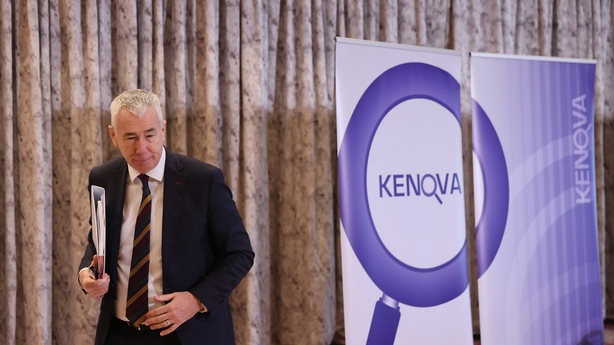The head of an inquiry that spent seven years investigating the activities of a man believed to have been the highest ranking British Army agent within the IRA has revealed that the security service MI5 did not disclose all the material it held about him before its findings were published earlier this year.
Hundreds of pages of newly disclosed material about the agent codenamed Stakeknife appear to identify new investigative leads and could cast doubt on some of the evidence obtained by Operation Kenova.
The inquiry was set up in 2016 to investigate the activities of Stakeknife and how he was managed by the security forces, including MI5.
Freddie Scappaticci, a Belfast bricklayer who was the son of an Italian immigrant, was Stakeknife: a state agent within the IRA who was allowed to kill other IRA members alleged to have been state agents, with the knowledge of his handlers.
He died in England last year while the huge investigation was taking place.
Operation Kenova cost more than £40 million and investigated more than 100 murders and abductions, but has not resulted in any prosecutions.
The commander of Operation Kenova, Iain Livingstone, has sent a letter setting out his concerns to Northern Secretary Hilary Benn, PSNI Chief Constable and former head of Operation Kenova Jon Boutcher, the director of the Northern Ireland Public Prosecution, and the head of MI5.

Mr Livingstone and Mr Boutcher have both previously publicly stated that they believed they had been given unprecedented access to all intelligence material about Stakeknife.
"You don't know what you don't know and in the back of one's mind there is always a concern that is there material, is there a file somewhere that hasn't been disclosed to us, I genuinely don't think that is the case," Mr Livingstone told RTÉ News in an interview in May.
"I think we've had unprecedented support from the agencies of the UK state, MI5, the MoD [Ministry of Defence], the PSNI in terms of RUC files."
That view has now changed.
In his letter, Mr Livingstone says the findings of the interim Kenova report, files submitted to the Public Prosecution Service and information provided to families, were all based "on the understanding that Operation Kenova had been given full access to all MI5 files relating to the agent Stakeknife".
He reveals that on 8 April, exactly a month after the findings of the investigation were published, he was informed that further relevant MI5 files had been found. Additional material has been discovered since then, and the searching is not yet complete.
Mr Livingstone says it is "of great concern" that further material continues to be given to his team nearly eight years after the investigation commenced.
The letter says he has instructed senior legal counsel to assess the new material received, adding that the initial assessment is that the new files "contain significant new material which appears to point to new investigative leads that were not previously known".
It adds: "Importantly the material does not indicate further murders of individuals that involved the agent Stakeknife and as such no further deaths would fall into the Operation Kenova terms of reference based on the now disclosed material.
"However, the material does appear to cast doubt on some of the documents and witness evidence obtained by Kenova and some statements made in the Interim Report. This includes information provided by the security service around the dates when they became aware of the agent Stakeknife."

In a statement today, Mr Livingstone said that based on an initial assessment it appears that all the newly disclosed material relates solely to the activities of Stakeknife and not other Kenova investigations, including Operation Denton.
Operation Denton is examining the activities of the so-called Glenanne Gang, which was based in Co Armagh and Mid-Ulster during the Troubles.
The gang included serving members of the RUC and the locally recruited British army regiment the UDR working alongside members of the loyalist paramilitary group the UVF.
The Denton inquiry is examining 127 killings linked to the gang, including the murders of 34 people, including one unborn child, in the Dublin and Monaghan bombings in May 1974.
Iain Livingstone told RTÉ's Prime Time in May this year that he has no doubt there was collusion between the gang and the British security services.
We need your consent to load this rte-player contentWe use rte-player to manage extra content that can set cookies on your device and collect data about your activity. Please review their details and accept them to load the content.Manage Preferences
'Disgraceful' that information was withheld
A Sinn Féin MP has said that it was "disgraceful and unsurprising" that the British security service withheld information from the inquiry.
John Finucane said any further delay in the publication of the findings of the Kenova investigation would add to the trauma and the anguish of families who have waited for truth for decades.
"As the British government's shameful Legacy Act was enacted to close down families’ access to the civil and criminal courts, British intelligence services have delayed the release of information to families who have waited for the truth for decades," he said in a statement.
"The discovery that MI5 did not disclose vital information to the Kenova Inquiry may now further delay the publication of the full report into the investigation.
"This revelation will add to the trauma and the anguish of families of the victims, and I am calling on the investigation to process the new information as thoroughly and as quickly as possible," Mr Finucane added.
In a statement, Mr Boutcher said : "It is unacceptable that MI5 continue to provide material to the Operation Kenova Team so long after they undertook to have given full access to Kenova of all the material they held about the agent Stakeknife. My interim report highlighted a number of issues in obtaining information from MI5 and I reported the similar experiences of Lord Stevens, Judge Cory and others who each called out the unacceptable practices of those not co-operating with and withholding information from legacy investigations.
"The fact that this information continues to be provided to the Operation Kenova Team after the Public Prosecution Service have directed on the files submitted to them will cause further upset to the families who had already waited many years to find out what happened to their loved ones," he added.
"I am confident that the Officer in charge of Operation Kenova, Sir Iain Livingstone will ensure all the material is fully assessed and will liaise closely with the Director of the Public Prosecution Service to determine if any further direction is necessary.
"I want to personally reassure the families who have put their trust in the Operation Kenova that Sir Iain and his team will do everything necessary to analyse the material for any new evidence," he said.







